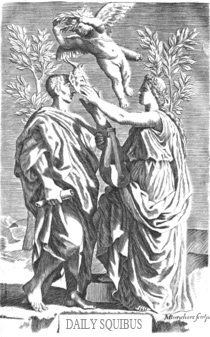Satire is the last bastion of free speech, and when that is diminished, we will know that Western society and democracy as a whole have been irreparably damaged. Our satirical muse is Juvenal.
Democracy cannot exist when all oppositional voices are cancelled, ghost banned, or unjustly branded negatively. Democratic elections cannot exist when the opposition has been removed.
Here at the Daily Squib we are staunch guardians of free speech whether it be satirical or any other form of literature. Democracy cannot exist without freedom of speech or expression, including the right to offend. The censorious internet monopoly conglomerates have tried to kill free speech and democracy in the West — the Daily Squib fights for freedom — the all-encompassing controlling monopoly that has taken over the internet is a detriment to democratic values of free speech and elections through its totalitarian control bias, and to all the West’s previously hard-fought freedoms.
QUIS CUSTODIET IPSOS CUSTODES (Juvenal Satirae VI, 347-348)
Once our hard-fought freedoms are gone, they will be gone forever, therefore they must be guarded and respected and given the utmost importance. Satire is thus the last post before it all disappears down the toilet hole.
If you threaten free speech, you’re a fascist.
If you try to disenfranchise the voting rights of others, you’re a fascist.
If you try to control the language of others, you’re a fascist.
If you control the news media, you’re a fascist.
Freedom of speech and satire is a fundamental pillar of democratic societies, safeguarding an individual’s right to express their ideas, opinions, and beliefs without fear of censorship or punishment. It is a cornerstone of open debate, the exchange of ideas, and the progression of society. However, in recent years, the rise of Woke “cancel culture” has sparked concerns about its potential to stifle free speech and undermine the principles of open dialogue.
- Promotion of Free Exchange of Ideas: Freedom of speech fosters an environment where diverse perspectives can be openly discussed. This marketplace of ideas allows for the exploration of differing viewpoints, leading to critical thinking, informed decision-making, and societal progress.
- Protection of Dissent: In democratic societies, freedom of speech safeguards the right to dissent and criticise those in power. It enables citizens to hold governments, institutions, and individuals accountable for their actions, thus ensuring a check on potential abuses of authority.
- Cultural Enrichment: Freedom of speech is also essential for cultural enrichment. It encourages the expression of art, literature, music, and various forms of creative endeavours that may challenge prevailing norms and inspire innovation.
- Personal Empowerment: Individuals are empowered when they can speak their minds without fear of repression. This empowerment can lead to increased self-esteem and personal growth, as well as a sense of active participation in society.
The Problem with Wokism and Cancel Culture
Cancel culture, in its most extreme forms, can have detrimental consequences:
- Lack of Due Process: Cancel culture often operates without due process or fairness. Accusations and allegations can lead to immediate condemnation and consequences, sometimes without an opportunity for the accused to defend themselves or address the situation adequately.
- Chilling Effect on Speech: The fear of being cancelled can stifle open dialogue. People may self-censor to avoid potential backlash, resulting in a reluctance to express opinions or ideas that do not align with popular or prevailing views.
- Oversimplification: Cancel culture often reduces complex issues to a binary choice: support or cancel. This oversimplification can hinder nuanced discussions and understanding, preventing productive engagement with different perspectives.
- Mob Mentality: Cancel culture is usually driven by social media mobs, where a vocal group exerts pressure and influence on individuals, organisations, or institutions. This mob mentality can lead to hasty decisions and unfair treatment.
- Potential for Overreach: In some cases, cancel culture can target individuals for minor or unintentional transgressions, potentially ruining careers and reputations over relatively insignificant matters.
Freedom of speech and satire is a foundational principle that allows for the open exchange of ideas, the protection of dissent, the right to offend, and personal empowerment. However, the rise of cancel culture, with its potential to stifle free speech and promote a social order of totalitarian censorship, poses a significant challenge to these principles. Fairness, due process, and constructive dialogue should take precedence over punitive measures that can hinder free speech.
@DAILYSQUIB Twitter account has been permanently shadow-banned. Elon Musk, supposedly supports free speech, but his censorious actions against the Daily Squib show otherwise. He is therefore nothing but a liar, and a fraud.
Please support our satire website, as we have been unfairly, disproportionately prejudiced simply for our stance on writing satire and fighting for freedom and democracy.

“..difficile est saturam non scribere.”
FREEDOM OF SPEECH




